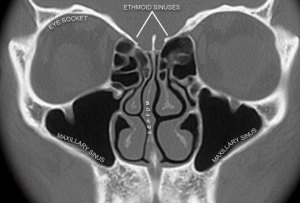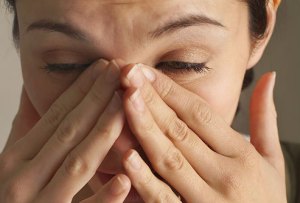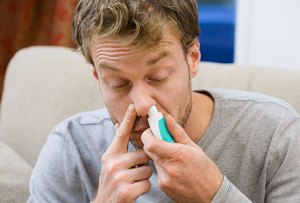

|
Jom Kenali Sinusitis!
May 24, 2011 @ 4:03 PM | 0 Comment [s]
Apa itu sinusitis?Sinusitis atau resdung ialah keadaan di mana infeksi atau alergi yang menjadikan tisu membran sinus membengkak dan berwarna merah. Ini menyebabkan seseorang itu mengalami hidung tersumbat, terasa sakit dan tekanan di beberapa kawasan muka, dan selalunya mengeluarkan cecair (selesema) berwarna kuning, hijau atau jernih. Simptom ini selalu diikuti dengan rasa pening, sakit kepala, kepala rasa berat, letih, batuk-batuk dan sakit tekak. Berikut dipanjangkan tanda-tanda untuk mengenal resdung dan rawatan biasa yang dilakukan. Resdung ini menjadi lebih teruk, terutamanya apabila cuaca berubah atau keadaan-keadaan tertentu yang boleh merangsangnya….. Sinus Attack!  Pain in the forehead or between the eyes? Upper teeth ache? Face feeling full, nose stuffy and congested? The number one reason for visits to a doctor’s office: sinus problems and sinus-related symptoms. Sinuses: Air Spaces in Your Head  Sinuses are air spaces in your skull lined with mucous membranes. You have four sets of nasal sinuses: * two frontal sinuses in the forehead above the eyes * two maxillary sinuses, one inside each cheek bone (dark triangles seen in this CAT scan) * ethmoid sinuses: a beehive of 18 to 22 cavities behind the bridge of the nose (also shown here) * sphenoid sinuses, behind the nose and underneath the brain Sinuses are like fingerprints; everybody’s are different. What Is Sinusitis?  Tiny, hair-like structures called cilia (magnified here) help move mucus across sinus membranes and toward an exit. All of your sinus cavities connect to your nose to allow a free exchange of air and mucus. Infections or allergies make sinus tissues inflamed, red, and swollen. That’s called sinusitis. Just a Cold … at First  Sinusitis usually starts with inflammation triggered by a cold, allergy attack, or irritant. But it may not end there. Colds, allergies, and irritants make sinus tissues swell. Stuffy, Puffy, and Sore  Sinusitis causes many symptoms. Most people have a stuffy nose and pain or pressure in several locations around the face or teeth. There’s usually a nasal discharge that may be yellow, green, or clear. Other symptoms may include fatigue, decreased sense of smell and/or taste, cough, sore throat, bad breath, headache, pain on bending forward, and fever. Chronic Sinusitis  The blue areas in this color-enhanced MRI show thickened mucosal surfaces on both maxillary sinuses. Inflammation of the sinus cavity that lasts for more than three months is chronic sinusitis. It affects about 32 million Americans. Although bacteria often colonize obstructed sinuses, it’s not clear that bacterial infections are the true cause of chronic sinusitis. Anatomy, allergies, polyps, immune deficiencies, and dental diseases may also cause chronic sinus problems. Nasal Polyps  When sinuses remain inflamed, sinus membranes may thicken and swell. The swelling can be brisk enough to cause grape-like masses called polyps (shown here). Polyps may protrude from the sinus into the nasal passage and partially or completely block the nasal airway. Nasal Decongestants: Relief, at a Cost  These sprays open swollen nasal passages and allow your sinuses to drain. That can be helpful, especially during the worst days of a cold or during air travel. But you should use these drugs only for a few days. After that, there’s a kick-back effect, making your nasal passages swell shut again. Decongestants are not indicated for chronic use. Oral decongestants may help, but also have side effects. Better solutions for acute sinus symptoms: nasal steroid sprays or saline sprays or washes. If symptoms persist, see your doctor. Chronic sinus symptoms may be caused by a deviated septum or another treatable condition. Antibiotics Usually Not Needed  The common cold is a viral infection. Colds can lead to sinusitis symptoms, but these usually clear by themselves. Antibiotics do not treat viruses, so they won’t help the sinus symptoms of a cold. Cold symptoms end in seven to 14 days. Usually, cold-related sinusitis goes away then, too. Shown here is a magnified, color-enhanced image of a rhinovirus pathogen responsible for the common cold. Treating Allergy-Related Sinusitis  What can help allergy-related sinus symptoms is irrigation with saline solution, either with a neti pot or squeeze bottle — if your nasal passages aren’t blocked. Although there’s no evidence they help with sinus infections, nasal steroid sprays may help some people suffering sinus symptoms from allergies. Antihistamines may help, too, especially for symptoms of sneezing and runny nose. When to See the Doctor  About 80% of the time, yellow or green mucus means a bacterial infection. Even then, acute bacterial sinusitis usually clears up in 7 to 14 days — without antibiotic treatment. But if you keep feeling worse and symptoms are persistent and severe, or if you get a fever, it’s time to see a doctor. Chronic Sinusitis Treatment Still a Puzzle  Chronic sinusitis is very difficult to treat. A first step is controlling predisposing factors such as eliminating environmental irritants. For symptom relief, doctors often prescribe nasal steroid sprays or antibiotics, but neither is proven to work in comprehensive studies. Surgery — functional endoscopic sinus surgery or FESS — offers at least moderate relief to 80% to 90% of patients — but this is not intended as first-line treatment for chronic sinusitis. Sinusitis Complications: Worst-Case Scenarios  Only a layer of bone separates your sinuses from your brain. If a sinus infection passes through the bone, it can infect the lining of the brain — meningitis — or even the brain itself. Both problems are life threatening. A sinus infection can also spread into the orbit of the eye, possibly causing blindness. And, sinus infections can lead to potentially fatal aneurysms or infected blood clots. These complications are rare. Less severe complications include asthma attacks and loss of smell or taste. Preventing Sinusitis There’s no sure way to avoid either acute or chronic sinusitis. But here are some things that can help: * Keep sinuses moist — use saline sprays or nasal irrigation often * Avoid very dry indoor environments. * Avoid exposure to irritants, such as cigarette smoke or strong chemical odors Source |
 
    |